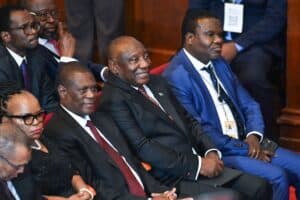Ramaphosa defends B-BBEE as critical to equality and growth, assuring MPs the policy will not be revised to appease foreign investors.

President Cyril Ramaphosa has stressed the need to dispel the notion that transformation and growth are mutually exclusive, arguing that Broad-Based Black Economic Empowerment (B-BBEE) is essential for broad-based growth and prosperity.
During an oral question-and-answer session before the National Council of Provinces (NCOP) on Wednesday, the president reaffirmed the government’s commitment to B-BBEE, referencing various policy documents and public statements.
DA MP Nicolaas Pienaar asked President Ramaphosa whether the government of national unity (GNU) should revise B-BBEE policies to attract more international investment by making them more effective and inclusive to drive economic growth and job creation.
B-BBEE is ‘compatible with investment and growth’
The president emphasised the need for demonstrable steps to ensure the achievement of equality and the involvement of all South Africans in transformation processes.
“Black economic empowerment is not only compatible with investment and growth, but is essential to the achievement of broad-based growth as well as prosperity,” he said.
The president noted that previous governments had implemented laws and measures that allowed only minorities to benefit.
ALSO READ: Is the National Dialogue a distraction or democratic necessity?
He argued that the current government must act decisively and explicitly to ensure genuine progress toward equality.
“However, despite the progress that has been made across a range of measures, we can do better. As with any other policy, we must constantly assess whether we are achieving our goals and whether we are making the improvements that we wanted,” Ramaphosa said.
Pienaar asked a follow-up question about Elon Musk’s internet service Starlink, and supporting investment that delivers internet access to rural communities without requiring businesses to hand over 30% of their companies.
‘Equity equivalent measures’
Ramaphosa discussed the “innovative” equity equivalent measures that allow offshore-based companies to participate in the transformation process with joint ownership.
He explained that many major companies have embraced this solution and are actively investing in the country.
“We are not averse to coming up with good solutions, as long as there is commitment to transformation that, to us, is not negotiable and we will not turn back from that,” he said.
ALSO READ: ‘Hijacked’ by the ANC? Maimane issues National Dialogue warning
Ramaphosa stressed that economic transformation remains essential for the shared prosperity of all South Africans, as enshrined in the Constitution.
EFF MP Meisie Kennedy raised concerns about the misuse of B-BBEE policies by the politically connected elite, who allegedly syphon billions of rands under the guise of empowerment.
She asked the president about measures to prevent unregulated foreign control infrastructures from bypassing necessary B-BBEE laws in relation to Starlink.
Measures will not violate constitution or laws
Ramaphosa mentioned that Minister of Communications and Digital Technologies Solly Malatsi has announced public hearings to discuss the efficacy of the announced measures.
“There’s no violation as far as he’s concerned and as far as I’m concerned, with regard to our laws, and it’s not specifically aimed at one or another company,” he said.
The president made assurances that the measures will not violate the constitution or any laws.
ALSO READ: ConCourt’s ‘humanistic jurisprudence’ a source of pride, Ramaphosa says
Later in the session, MK Party MP Seeng Mmabatho Mokoena asked Ramaphosa to provide an explanation for the government’s failure to deliver tangible results in youth unemployment.
Meanwhile, the latest Quarterly Labour Force Survey from Statistics South Africa showed that the number of unemployed youth increased by 151 000 to 4.8 million, while the number of employed youth dropped by 153 000 to 5.7 million.
Ramaphosa acknowledged the critical challenge of youth unemployment and outlined various interventions, including the Presidential Employment Stimulus and the Basic Education Employment Initiative.
‘We need to move faster to create the jobs’
He also mentioned the Employment Tax Incentive, the Youth Employment Service, and the Jobs Boost Outcomes Fund.
The president emphasised that South Africa must accelerate economic growth to tackle youth unemployment and highlighted ongoing reforms aimed at making the economy more attractive to investors.
“We recognised that young people remain frustrated with the pace of change, and as we increased access for them to get an education, we need to move faster to create the jobs that they now need,” Ramaphosa said.
ALSO READ: Ramaphosa calls for dialogue to end Israel-Iran conflict
In her follow-up question, Mokoena criticised the slow pace and limited impact of the reforms and called for measurable results by 2026.
In his reply, the president acknowledged the low-growth economic trajectory and the need to address constraints that hinder economic growth, such as electricity challenges and local government capabilities.
Ramaphosa responded by stressing the need to strengthen the state’s capacity to drive economic growth and reduce youth unemployment.
National Dialogue
ANC MP Jane Mananiso called for the National Dialogue to address various youth challenges, including sustainable jobs and the inclusion of diverse groups like people with disabilities, LGBTQIA+ people, and youth in conflict with the law.
He agreed on the importance of inclusive programmes and highlighted the need to address mental health challenges among unemployed youth.
Watch the President Ramaphosa Q&A here:
NOW READ: ‘Money will be made available’: Ramaphosa plans to make judiciary fully independent






